Canada's Sochi superfans explain how to do the Olympics right
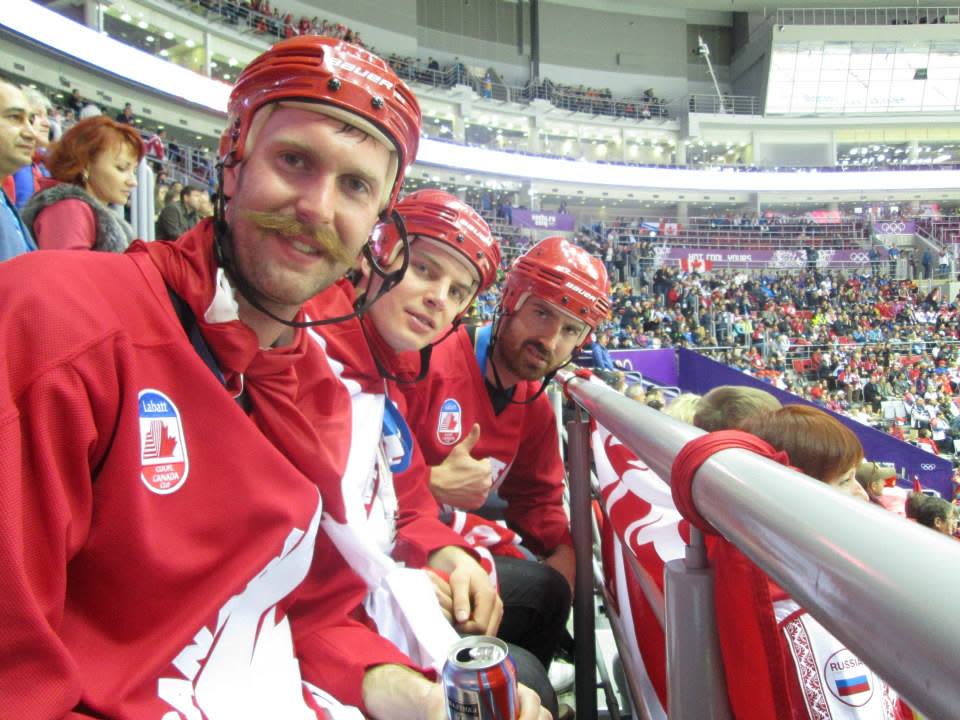
Last time the Winter Olympics rolled around, Canada was represented with distinction by 222 athletes in 14 sports who collected 25 medals — the third best total in the world.
But beyond the competitors, the country was also represented by its fans, who travelled all the way to Russia to cheer for Canada. Four years ago, there’s a strong argument to be made the faces of those fans were Rob Kneteman, Scott Simms and Morgan Simms (no relation).
Thanks to a seemingly-unlimited supply of enthusiasm, top-notch outfits, a potent size and volume combination, and general Canadian-ness, the trio from Alberta soon began to capture the imagination of journalists. As well as a number of TV appearances, mentions of Kneteman and the two Simms cropped up in publications like the Toronto Star, The Wall Street Journal and The Montreal Gazette, and their photos were taken by both Canadian Press and Associated Press.
It’s fair to say these guys know their way around Olympic fandom. What follows is what you need to do to get on their level. Fair warning, though, following in their footprints is not for the faint of liver. If you’re looking for a teetotaler’s guide to the Olympics, this ain’t it.
Know the laws

When you travel abroad no one is expecting you to be a legal scholar, but a couple of Google searches never hurt anyone. The Canadians were certainly blindsided by Russian alcohol laws when they arrived at their first curling event in Sochi.
“We knew Piva meant beer, so we ordered a couple of tall boys, and there was a brand called Baltica and they had this one or that one,” Scott Simms recalled. “And as we were drinking it we look at the can and notice it’s non-alcoholic beer. We immediately thought, ‘we’re not drinking that.'”
As it turns out they would have had no problems a couple of years earlier. Until 2011 Russia officially categorized beer as a “foodstuff” as opposed to an alcoholic beverage. New rules came into effect two years later putting restrictions on where and when it could be sold.
The beer situation was a hiccup off the top, but it didn’t take long for Simms and his friends to adjust.
Channel your inner Han Solo
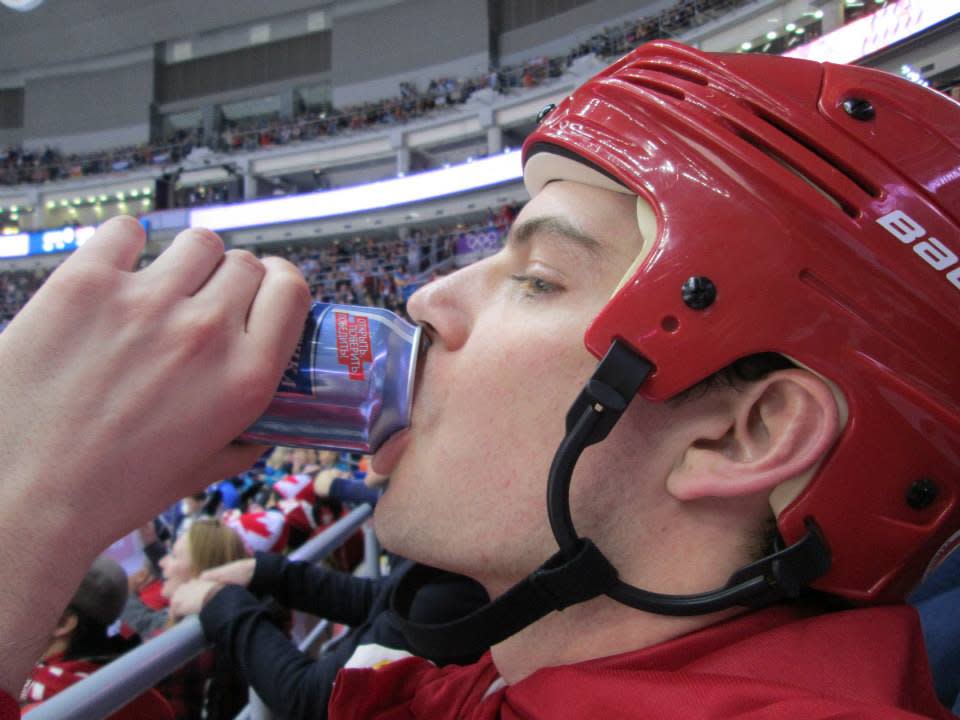
Once it became clear that buying beer at events was going to be impossible, the idea of going without was never tabled. Instead, it was time to learn how to smuggle.
“At the beginning we walked in with a couple beers. Then after a couple of days security said ‘you can’t do that.’ So you go from having beers in your hand to having them in a backpack,” Simms explained. “Then you hide them in your back pockets and pull your jersey down. Then we incorporated Canada flags and wore the backpack under the cape.”
Kneteman quickly learned one of the best ways to get a lot of beer in was to sacrifice some for the greater good.
“We’d carry beers in our hands as we walked in, as a distraction for all the beers we had on us. So Scott would wear a backpack under his cape and that would be filled with beer,” he said. “We would have beers in our hands and they would say ‘whoa you can’t bring those in’ and then we’d say ‘Ok we’ll drink them and head in’ and they’d say ‘OK thanks for doing that, go ahead.’”
Slowly but surely, the arena security would catch up to each method and they would have to stay one step ahead. Luckily for Simms, their adversaries weren’t the toughest customers.
“It was literally like dealing with [Trailer Park Boys cop] George Green,” he said. “It was just about being smarter every day.”
As word started to get out about their exploits in moving large quantities of beer into the games they had more and more Canadians trying to get in on the fun.
“People were seeing us on TV and were looking for us on the ground,” Simms said. “All the Canadians kept coming to us. One guy I still keep in touch with knew me as his personal beer smuggler.”
Even some high-profile Canadian athletes enlisted their assistance.
“One game, Alexandre Bilodeau, the mogul skier who had just won a gold medal, sat down behind us,” Kneteman recalls. “He said, ‘Hey guys I haven’t been able to get a beer in here, would I be able to steal one off you guys?” “I said, ‘Man, you just won back-to-back gold medals for Canada, you can have ’em all.'”
Find your Switzerland House
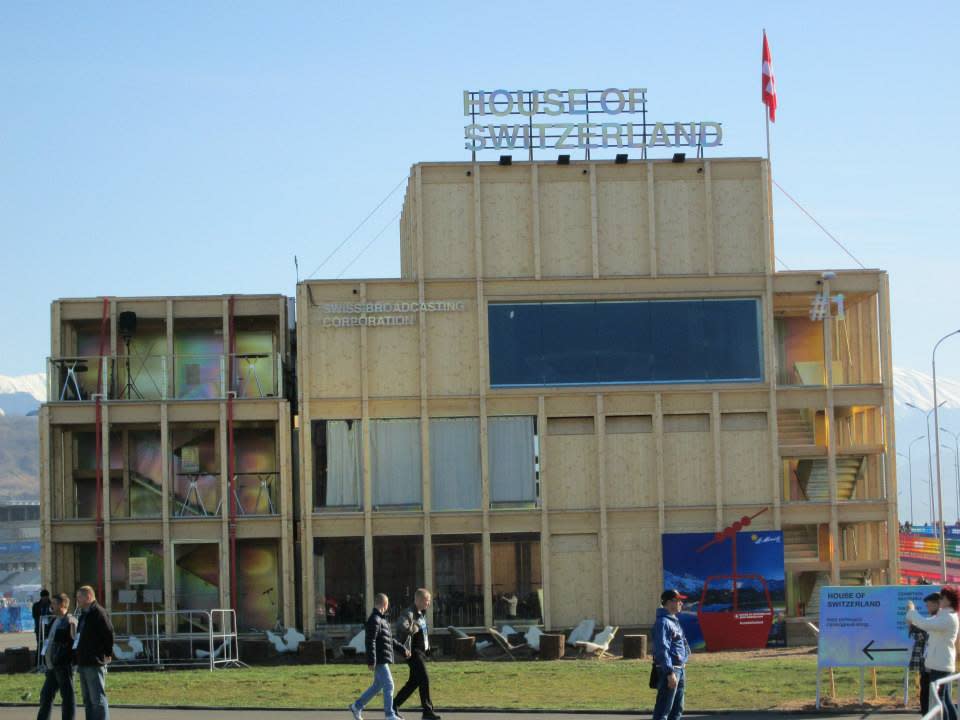
Due to its famous neutrality, Switzerland has a reputation as a safe haven for people from all over the world, or their money. During the Sochi Games, Switzerland House served as a different kind of haven: a haven for the thirsty traveller.
“The Swiss House just let everybody in and it was just a good party. They were super friendly and they enjoyed people from all sorts of countries coming there,” Kneteman said. “That made it awesome because it just sort of became the hangout place for everybody from all over the world.”
Other countries’ “houses” were just open to athletes, coaches, family and friends, but the Swiss decided to open theirs to the public. They set up a bar on the main level and it was a smashing success.
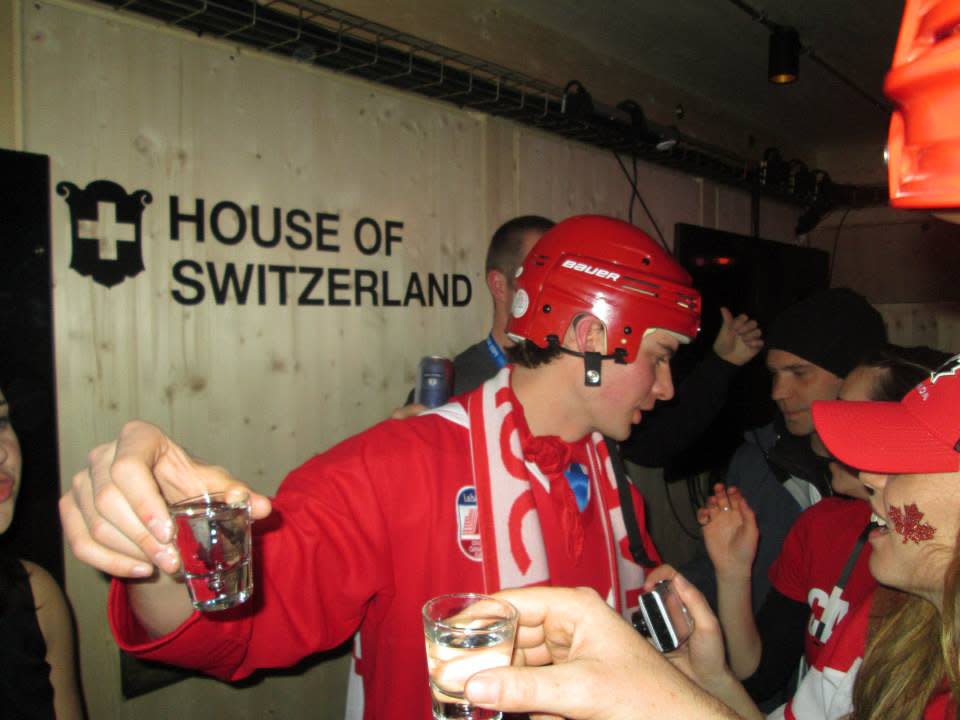
“In between events you’d hang out at Swiss House and drink beer,” Simms explains. “It was like $5 a tallboy. Not insane, not a steal. But if you asked for 24 they’d give you a flat. It was just ‘how many beers do you want?’ They didn’t give a [expletive].”
Whether Switzerland decides to replicate this model or not in Pyeongchang remains to be seen, but having a home base is invaluable.
Expect the unexpected
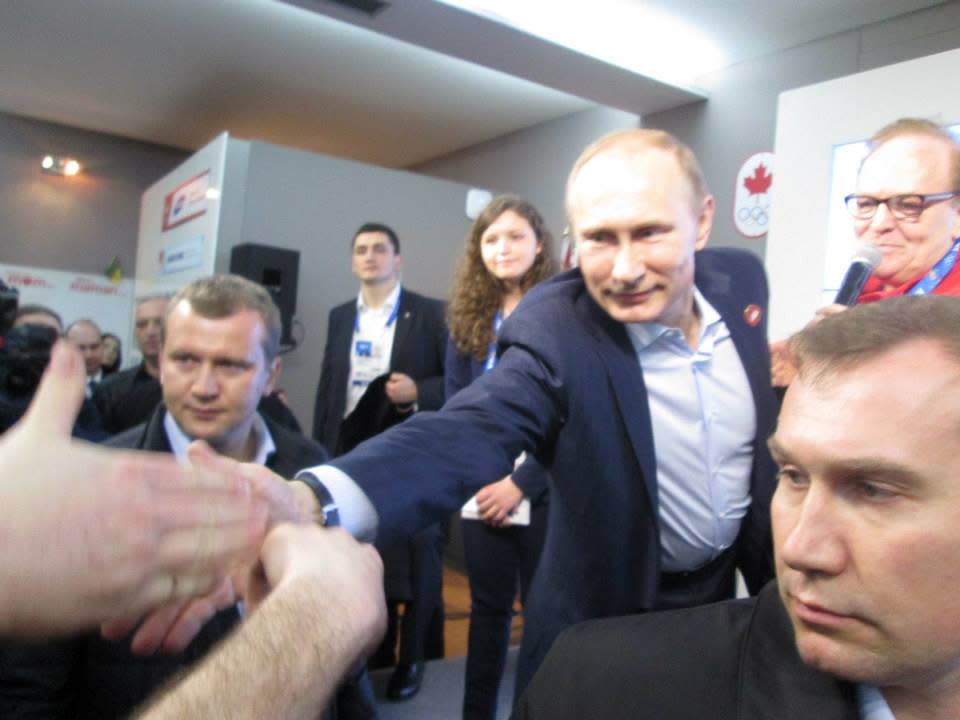
The Olympics is an extraordinary gathering of people from all around the world that goes far beyond the athletes. The two Simms and Kneteman learned that when they were finally admitted into Canada House for the first time on Feb. 14.
At what appeared to be a simple meet and greet for the Canadians who’d made the pilgrimage to Sochi, the trio found themselves face-to-face with Vladimir Putin. The Russian president entered unannounced with a secret service entourage and made a brief comment on stage before shaking a few hands and being whisked off to his next destination.
“I’m not saying I’m a pro-Putin guy,” Simms said, in something of an understatement. “But when you see one of the top two most powerful people on the planet, between him and Barack Obama, and you get a chance to shake the hand and take a photo? Absolutely.”
The brief encounter had a surreal feel to it that was amplified by the technological blackout that accompanied it.
“The one thing I do remember is all the cell phone service cut out when Putin came into Canada House which was pretty crazy,” Kneteman said. “Everybody’s service just disappeared.”
You never know who you’re going to run into in life, but that principle applies twofold at the Olympics.
Prepare to barter
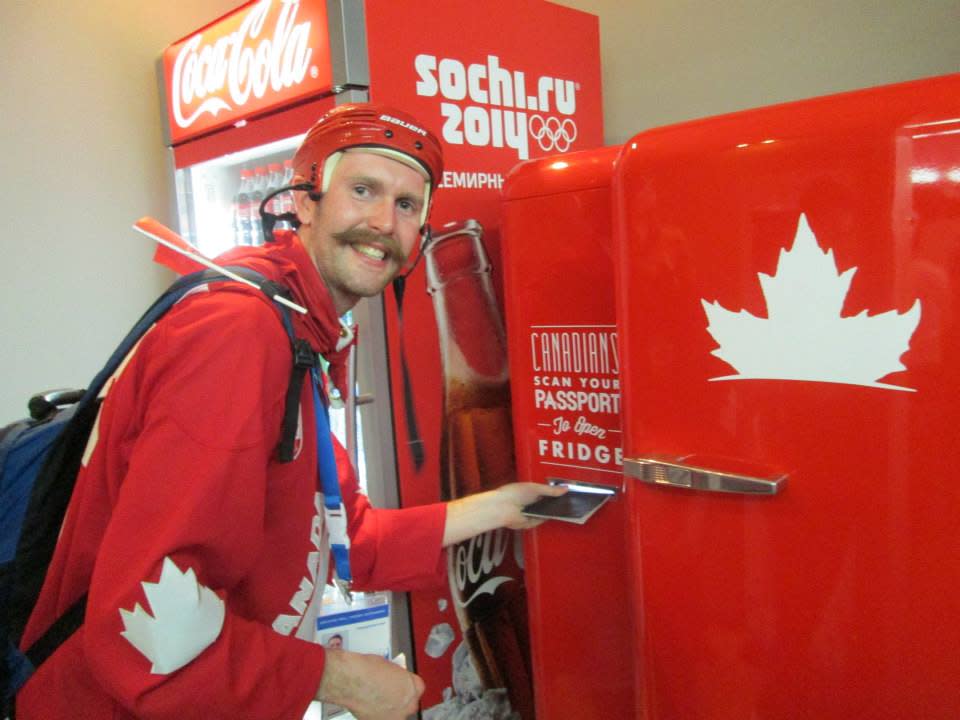
South Korea has the 11th largest economy in the world, with an extraordinarily complex combination of high-tech, vehicle manufacturing and mining sectors, but if you make the trip to Pyeongchang, be prepared for some old-school bartering. That doesn’t mean that stores and restaurants won’t take your money, just that the best souvenirs you can get will be bought with Canadian paraphernalia.
“The red Canada mitts that came out in 2010, but they still make them? Those are worth their weight in gold,” Simms explained. “People will give you anything for Canada stuff internationally.”
The 31-year-old had encountered this phenomenon before and came prepared.
“I brought five toques, didn’t come home with any. Five pairs of mitts, didn’t come home with any. A few scarves, those are gone.”
Olympic fans and travellers of all stripes are interested in genuine-article gear from other countries and given Canada’s positive reputation around the world, anything emblazoned with the maple leaf will be in demand. If you’re into pins, you’re especially in luck as there is a robust pin-trading scene surrounding the Olympics.
Bring a varied cast of characters
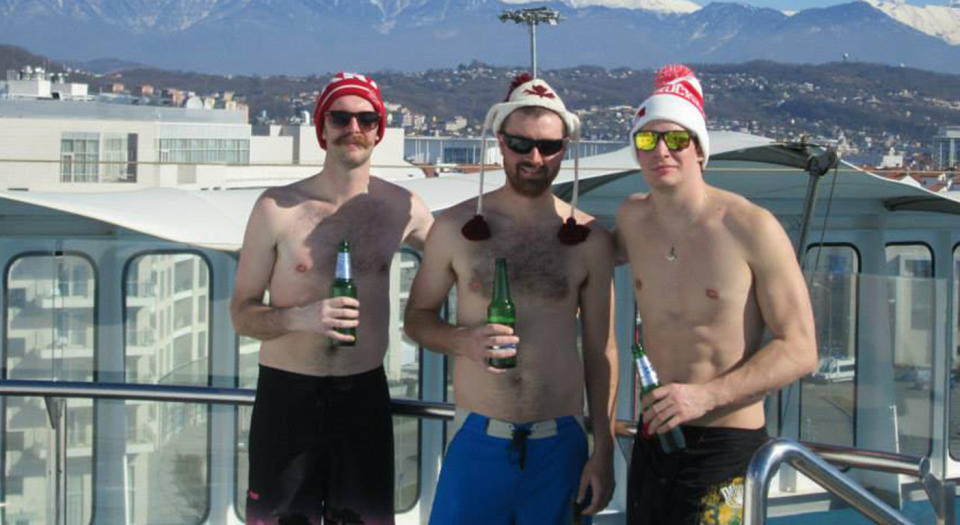
A trip to the Olympics is a marathon, not a sprint. As a result, it’s important to bring a crew that has the kind of endurance it takes to make it to the end. It’s also crucial to have someone responsible enough to make sure everyone makes it to all of the events.
“It was about 15 straight days of partying and going to all these crazy events,” Kneteman said. “So you do need people who are just ready to go all the time. You need someone who wants to be there.”
For this group, Kneteman kept everyone on the straight and narrow while the two Simms kept him going.
“Scottie’s a wild man and Morg is too and I was the guy who would keep everyone on track,” he said. “As soon as someone started to slow down Scottie would speed him up.”
In order to strike the perfect balance in Sochi, the Alberta boys needed to assemble the perfect crew. If you have your eyes on Pyeongchang, the people you bring with you might be the most important part of the plan.
More Olympic coverage from Yahoo Canada Sports:

 Yahoo Sports
Yahoo Sports 

